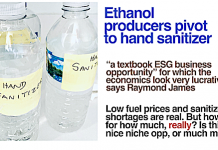Jim Lane
In France, Cray Valley has launched new tackifying resins produced with Amyris’ (AMRS) biologically derived Biofene branded farnesene.
Tack is the measure of stickiness vital to everything from adhesives that need to hold things in place to inks that need to stay on the printed page.
According to independent market research firm, MarketsandMarkets.com, the global tackifier market is projected to reach USD 3.56 billion by 2020. This poses a large opportunity for renewable farnesene-based tackifiers and Amyris believes it can access a large market share as its product applications within the space achieve commercial scale.
Cray Valley’s Wingtack family of tackifying resins have been manufactured with piperylene (a volatile hydrocarbon that is a byproduct of ethylene production) as a primary source. Other tackifier resins typically are derived from trees or citrus fruit sources.
The Cray Valley backstory
Total Cray Valley is part of Total’s Polymers division within the Refining & Chemicals branch. Total Cray Valley manufactures Wingtack and Cleartack hydrocarbon resins, Poly bd, Ricon and Krasol liquid polybutadiene resins, SMA® copolymer resins, and Dymalink monomers. These products are used as raw materials and additives for adhesives, rubber, electronics, thermoplastics, coatings and other applications.
The switch to biofene
Utilizing new technology has enabled Cray Valley to use farnesene as a sustainably-sourced 30% replacement for piperylene and add Wingtack EXTRA F30 to its product line of tackifiers while maintaining solid performance, particularly for use in hot melt and hot melt pressure sensitive adhesives. Cray Valley will showcase this new technology and its product line at the Adhesive and Sealant Council Conference and Expo.
The disruptive nature of Amyris’s farnesene has enabled Cray Valley to create new tackifying resins that are based on monomers from sustainable biomaterials. As a result, these farnesene-based resins are not subject to the cost and supply instabilities of petroleum-based monomers or the typical natural variabilities that affect the quality of pinene and limonene monomers.
“We are pleased to support Cray Valley in the launch of new tackifiers with excellent performance characteristics that support growth in sustainably produced resin products for the large global market for these applications,” said John Melo, President & CEO of Amyris.
The Biofene backstory
Amyris’s sugar cane-derived Biofene forms the basis for a wide range of products varying from specialty products such as cosmetics, perfumes, detergents and industrial lubricants, to transportation fuels such as diesel and jet fuel. As a tailor made pure hydrocarbon it provides numerous advantages when compared to petroleum-based oils and chemicals and is renewable, contributing to a sustainable future.
Jim Lane is editor of Biofuels Digest., where this article was originally published. Biofuels Digest is the most widely read Biofuels daily read by 14,000+ organizations. Subscribe here.








